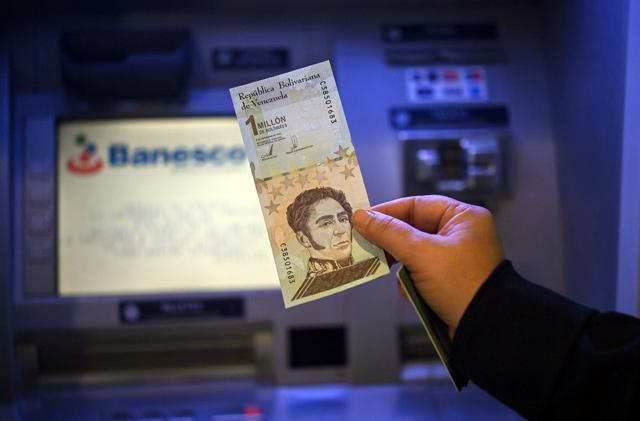You are here
Venezuela to repay $2b of debt to local importers
By AFP - Jun 02,2014 - Last updated at Jun 02,2014
CARACAS — Venezuela will repay a small part of its debt to local importers, after currency controls have sparked mass shortages of basic goods in the oil-rich country.
The government said it will disburse roughly $2 billion — significantly less than the $14 billion the disgruntled private sector firms say they are owed in hard currency and need to pay their parent companies or foreign suppliers.
The debt stems from Venezuela's strict exchange rate controls, which require companies to sell products in bolivars, the national currency, on the government promise to reimburse them in dollars.
Rafael Ramirez, vice president for economic affairs, said $1.188 billion would be paid out this week to 939 small and medium-sized companies from "priority" sectors.
An additional $900 million will be allocated to large companies from various sectors, including $486 million for airlines, he told reporters.
With the controls in place since 2003, Venezuela is only providing US dollars at the official rate of 6.3 bolivars to importers of designated priority goods such as food and medical supplies.
Others who need dollars have to buy them at a higher rate of 10 to 50 bolivars. On the black market, the greenback can cost as much as 60 bolivars.
Venezuela, a member of the Organisation of Petroleum Exporting Countries (OPEC) sitting atop the world's largest proven oil reserves and imports most of what is consumes, is struggling with shortages of goods as basic as toilet paper.
In addition to high inflation and soaring crime, the shortages have fueled at times violent anti-government protests that have killed at least 42 people since February, with opposing sides trading blame for the bloodshed.
Since President Nicolas Maduro took power last year following the death of his mentor, longtime socialist leader Hugo Chavez, Venezuela has seen its economic situation deteriorate.
Separately, the government has decided to settle a small part of its $4 billion debt with international airlines, many of which have cut back or halted service to the oil-rich South American country.
The debt stems from strict exchange rate controls, which require airlines to sell tickets in bolivars on the government promise to reimburse them in dollars at the official rate of 6.3 to the dollar.
At least since August, the government has been withholding those payments, as it deals with a deepening foreign currency crunch despite its oil riches.
But the government made its first moves towards repaying airlines, although at a worse exchange rate, about 10 bolivars to the dollar.
It offered to settle a $7 million debt owed since 2012 to Colombia's Avianca airline, at a 30 per cent discount, the president of the Venezuelan airlines association, Humberto Figuera, said.
Venezuelan authorities also offered to settle its debts with AeroMexico, Insel Air, Tame Ecuador and Aruba at about 10 bolivars to the dollar, he added.
Venezuela's total debt with the four companies, which Figuera estimated to be less than $200 million, would be subject to additional discounts, decided on a case by case basis.
Transport Minister Hebert Garcia Plaza, for his part, said working groups have been set up with the airlines to agree on higher ticket prices, which would be reimbursed at a rate of 50 bolivars to the dollar after July 1.
Since last August, when the unpaid debts to the airlines began to mount, bolivar ticket prices have soared.
Figuera described the government's offer to make reduced debt payments as "good news".
The authorities "are beginning to make payments so that companies can continue to operate, even though the agreements they reached [with the government] are not being respected".
American Airlines reported in the first quarter results that it has $750 million blocked by Venezuela. The Panamanian airline Copa is seeking $487 million in payments, which exceeds its 2013 earnings, and Air France has unpaid debt amounting to 199 million euros ($271 million).
Over the past several months, Air Canada and Alitalia have suspended their flights to Venezuela and dozens of other airlines have reduced available seats by 15 to 75 per cent.
Related Articles
It is the third banknote reform in 13 years, with a staggering 14 zeroes shed since 2008 — giving Venezuela the "dubious" distinction of becoming the South American country to have lopped the most zeroes off its currency.
By Javier TovarAgence France-PresseCARACAS — Gustavo Martinez has a stable job as an engineer at an oil company in Caracas, but he can only
Venezuela has jailed the owners of an unnamed chain of shops accused of engineering queues to whip up anger with the socialist government, President Nicolas Maduro said on Sunday.
















